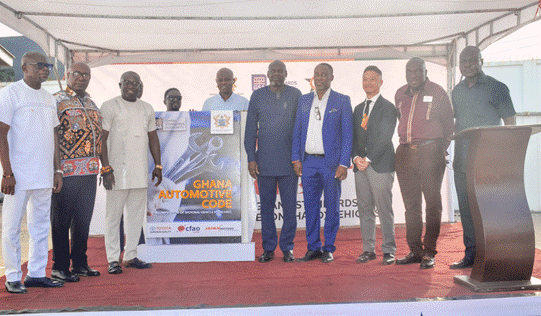
Government plans to introduce an asset-based financing scheme, working closely with the private sector for purchasing locally assembled vehicles in a bid to promote patronage of locally produced or assembled cars, Chief Director at the Ministry of Trade and Industries, Patrick Yaw Nimo, has disclosed.
This initiative is expected to significantly spur growth of the domestic automobile industry and lead to job creation, and further reduce reliance on imported vehicles.
Asset-based financing typically involves providing loans or financial assistance to individuals or businesses for the purchase of specific assets, such as vehicles. In this case, the focus is on locally assembled vehicles – which can stimulate demand for cars from domestic automakers and support the local automotive supply chain.
Speaking at the Ghana Automotive Code launch at the Ghana Automotive Centre in Accra, Mr. Yaw Nimo said: “We want to ensure that by these various measures we are putting in place, including the Ghana Automotive Code, we are creating an ecosystem which empowers us to emerge as competitive assemblers and manufacturers – equipping dealerships and suppliers to reap the industry’s benefits”.
He said the component manufacturing policy of the Ghana Automotive Code will ensure the safety of road users. Additionally, he said, it will ensure that assemblers have access to some local components which enhance their capacity to export under AfCFTA.
However, he stressed that the 26 national standards (contained in the Ghana Automotive Code) developed by the Ghana Standards Authority (GSA) can only work with the active support of stakeholders in the industry.
“So, let us all continue to support the implementation; otherwise, it will be a challenging, uphill task,” he said, adding that having the Automotive Governing Council in place is important. “We need feedback on the implementation,” he said.
The Chief Director assured that government will continue to work with all industry players while taking into account the challenges faced by stakeholders.
Director-General, GSA, Prof. Alexander Dodoo on his part explained that the policy document comprises four compulsory standards; three applying to M1, M2 and N1 vehicles, and the other applying to used vehicles.
“The standards are just to enable us to understand each other. They are the specifications and requirements,” he said.
He stressed this is particularly aimed at regulating the vehicles (manufacturers or assemblers) and not necessarily the dealerships.
The Ghana Automotive Code, among others, defines the requirements for importations of vehicles, new and used, into the country. As part of this standardisation, Prof. Dodoo disclosed that 38 locally assembled vehicles and 130 imported vehicles are captured under the vehicle homologation.
This, he noted, is being complied with by the industry – and insisted that persons who purchase vehicles should request the homologation certificates.
In response to the sanctions applying to non-compliant vehicle importers or assemblers of the stipulated measures, Prof. Dodoo clarified that the current Ghana Standards Act defines that: “The importer will be given a chance to meet the standards, however they want to do it. If they do not do this, the law states the Director-General of Ghana Standards Authority can cause that vehicle to be destroyed for the sake of public health and safety.
“We will not even approve it for Customs to clear. So, if you are bringing substandard vehicles, you have to contend with the Ghana Revenue Authority (GRA) and GSA; and if they don’t meet our standards, GRA is not going to give you the valuation,” he stated.









